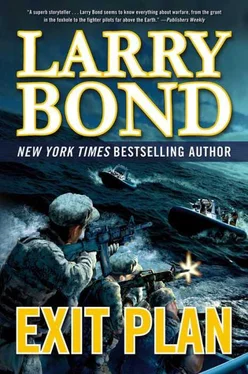“There, on the right. Between those two men.” Harry couldn’t point, but she saw two soldiers standing, with their rifles held at the ready, as if guarding something. Between them, on the ground, were bundles that she’d seen earlier, but dismissed as debris. Now she saw they were man-sized. There were four of them, partly covered with blankets, but she could see civilian clothes beneath.
Tears blurred her vision, and she started crying. Harry tried to shush her, and even put his arm around her shoulder, but he was not Yousef, and it held no comfort.
“Are you people all right?” Absorbed in her grief, she hadn’t noticed the policeman’s approach. Harry seemed surprised as well. “Is your wife injured?”
“She’s my sister-in-law,” Harry answered softly. “She’s just upset.”
The policeman nodded. “Women should not see such things. Why did you bring her here?”
“We were on our way to visit the Al Ali Castle when we heard the shooting. After it stopped, we were curious about the smoke.”
“And look what it got you,” the policeman’s tone was critical, almost angry. “This is none of your business, anyway. Go now.”
“Yes, Officer,” he answered, and Shirin let herself be led away. They walked through town back west and north. Fighting for control, she stopped her voice, but not her grief. The walk back seemed shorter. They were not stopped or questioned again.
Along the way, Harry tried to get her to talk, but she waved off his questions, thinking and trying to deal with her grief, and new fears. How would they get out of Iran now? Could they even get out? And if they didn’t, what about what they knew?
They reached the layup in late afternoon. She didn’t realize how exhausted she was until she saw Yousef, and almost collapsed in his arms. She began weeping again, completely losing the control she’d worked so hard to maintain.
While Yousef tended to his wife, Fazel explained to the others what had happened. Ramey took it hard, suddenly sitting down like he’d had the air let out of him. “We are so screwed,” Phillips complained.
“They’re hunting us for sure; chasing us,” Lapointe observed. “They’re rolling up her family, maybe people they know.”
Jerry felt badly for Shirin and her husband, and he really wasn’t sure what they’d do next. “We need another plan. What if we find a really good spot to hide and wait for a few days?”
“For the ‘heat to die down?”‘ Ramey asked. He started to say something else, but Shirin interrupted.
“No. There is no more time.” Wrapped in a blanket, holding a nearly empty water bottle, she looked like an accident victim, but her voice was strong. “I had hoped that Seyyed would be able to get us out soon, even tonight.”
Yousef said something to her, and she nodded, answering him in Farsi. “We must tell you something. I know it will sound fantastic, unbelievable. That is why we wanted to prove ourselves before saying anything, but that is not possible now. You must set up the radio and warn your government. The people in charge of the nuclear program, maybe the Iranian government itself, is trying to provoke an attack by the Israelis on Natanz.”
Jerry heard the words, but they didn’t make sense. “You’re saying they want the Israelis to attack? That’s insane! Why?”
“Because they are impatient for the confrontation, and the weapon isn’t ready. We won’t have it for years, if we get it at all. A public admittance of failure would be a colossal embarrassment for our leaders. If Natanz is destroyed, it’s not Iran’s fault anymore.”
Nobody said anything for a minute, and finally Shirin continued. “We don’t have proof — none of the files on the flash drive say anything about this, but what we know, what the files prove, is that their recent actions are completely at odds with the facts. There is no bomb to test.”
“Hundreds of my friends and coworkers will be killed, and a war will start because of pride and greed and fear of what will happen if they fail.”
“How soon?” Jerry asked.
“I don’t know exactly. The contingency planning I saw assumed that once we prepared to test a weapon, America, the Israelis, or both would attack within a week, or less. That’s why we weren’t going to test the first device we built, but the third or fourth. Any attack on us would be followed by the destruction of Israel by nuclear-armed ballistic missiles.”
Jerry told Lapointe, “Get the SATCOM radio set up. This is way beyond my pay grade. We’ll send this on and let the higher-ups sort this one out.”
“No,” Shirin insisted. “Do not just pass this on to someone else. We risked everything to get this information to the West.”
“And that’s what we’re going to do,” Jerry answered. “It’s all we can do, that and try to find bus tickets back home.”
6 April 2013
1445 Local Time/1145 Zulu
Seyyed Naseri’s House, Bandar Charak
VEVAK agent Hafez Omid surveyed the chaos with contempt. It was a typical Pasdaran operation, a frontal assault with no planning, no reconnaissance, and no thinking. Omid fumed as he took stock of all the opportunities those idiots in the bright green uniforms had cost them. And to make matters worse, the bumbling Pasdaran captain was touting this skirmish as a great victory! Victory? What did they have to show for this “great victory”? Four dead traitors whose knowledge was lost forever? Whatever secrets they had had were smoldering in the fireplace. Papers, laptop computers, cell phones, electronic storage media, all of it charred to uselessness by the flares the traitors had thrown onto the pile. Damn those incompetent Pasdar fools, cursed Omid to himself.
The air was still thick with smoke from the byproducts of gunfire, explosives, and burned-out flares. The acrid atmosphere assaulted his eyes, nose, and throat, worsening his already foul mood. He’d collect the burnt remains of the electronics. There was a slight chance that some of the data might have survived, but everything else was gone. Angrily, Omid stormed out of the house. He needed to find his partner, and he needed a cigarette.
Passing through what was left of the front door, Omid saw Teymour Sattari across the street taking the Pasdaran unit commander’s statement. No doubt elaborating on his military brilliance , Omid thought. He motioned for Sattari to get rid of the officer and join him. Pulling the pack of cigarettes from his jacket pocket, he withdrew one and lit up as Sattari approached.
“That bad?” Sattari asked. He could read the sour expression on his partner’s face.
“Worse. It’s probably a total loss. I’ll have the remains of the computers and cell phones sent to Tehran. We might get something if we are very lucky. But the discs and paper are nothing but ashes,” replied Omid, as he took another drag. “The traitorous bastards used magnesium roadside flares, six of them, to torch their information. They were quite effective.”
Sattari winced and shook his head; flares like that could easily get over one thousand degrees Centigrade. They would be lucky indeed if they recovered any useful information. Gesturing toward the battered house, he asked, “Do you think they were mujahadeen?”
“Of course they were MEK,” snapped Omid as he threw the last of the cigarette on the ground and stamped it out. “But there is absolutely no way we can benefit from that knowledge, because of that arrogant imbecile!” He pointed vigorously in the direction of the Pasdaran commander. “We lost our best chance to trace the network Naseri belonged to when that Pasdaran jackass stormed the house!”
Читать дальше












